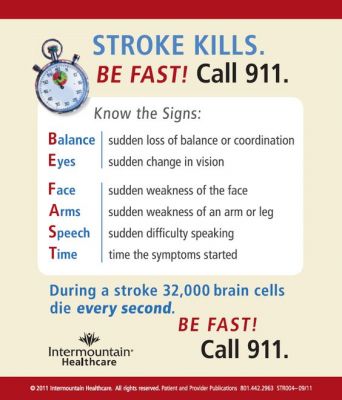Know the Signs for Stroke
Symptoms and Signs of Mild Stroke
Following are the most common symptoms of mild stroke:
- Dizziness
- Pain in chest
- Blurred vision
- Confusion
- Weakness
- Loss of balance and co-ordination
- Slurred speech
- Confusion
- Tingling
- Weakness in one hand and leg
- Numbness on the face
- Uneven smile
- Muscle stiffness
- Memory loss
- Difficulty in swallowing
Call your doctor if you experience the above symptoms and signs of mild stroke.
Strokes Symptoms and Signs in Men
For both women and men, stroke is identified by an inability to speak and recognize speech, a hassled expression, numbness on face and arms or legs and sudden confusion. An individual who is experiencing a stroke can also have trouble in speaking or interpreting conversation. There are no stroke signs and symptoms unique to men.
Signs and Symptoms of Strokes in Women
Women are less likely to receive a Tissue Plasminogen Activator (TPA) meant to break up blood clots. This is an important development because the most common type of stroke is caused a blood clot reaching the brain. In short, women tend to have “vaguer” stroke symptoms. In turn, they are not always treated as a sign of stroke which leads doctors to avoid the use of a tissue plasminogen activator.
Even though men are more inclined to possess a stroke, women hold a higher lifetime threat of stroke. Women are more prone to die from a stroke. Women encounter a greater possibility of getting a stroke for several reasons. Women live for a longer time than men. Most women have more stress than men have. Women will probably possess high blood pressure (hypertension) as compared to men. Pregnancy as well as birth control additionally increase a woman’s threat of stroke. The stroke signs and symptoms for women involve:
- Seizures
- Fainting
- Coordination problems
- Hiccups
- Shortness of Breath
- Nausea
- Pain (arms, legs, face)
- Chest Pain
As these signs and symptoms are unique to women, it might be hard to immediately link them with stroke. It will delay the treatment, leading to severe injuries, long-term disability, or loss of life.
To print a copy of the above information click on the file below.

